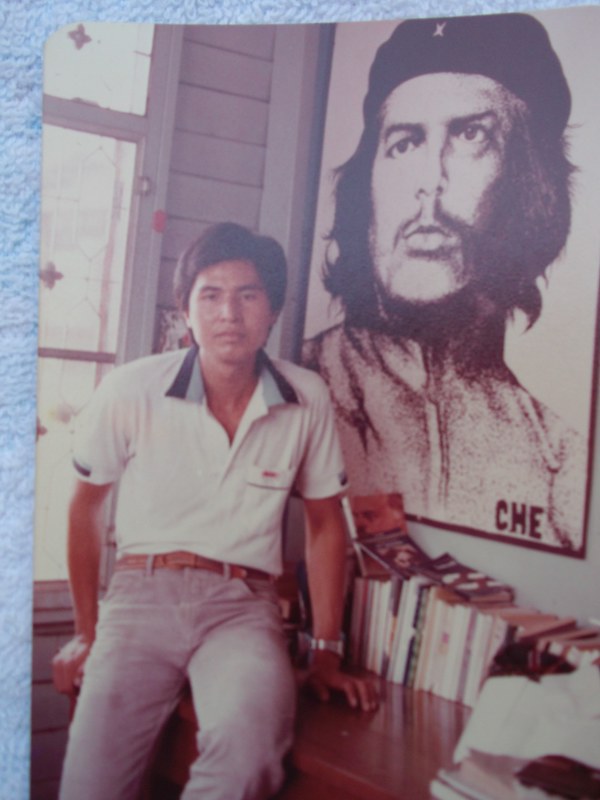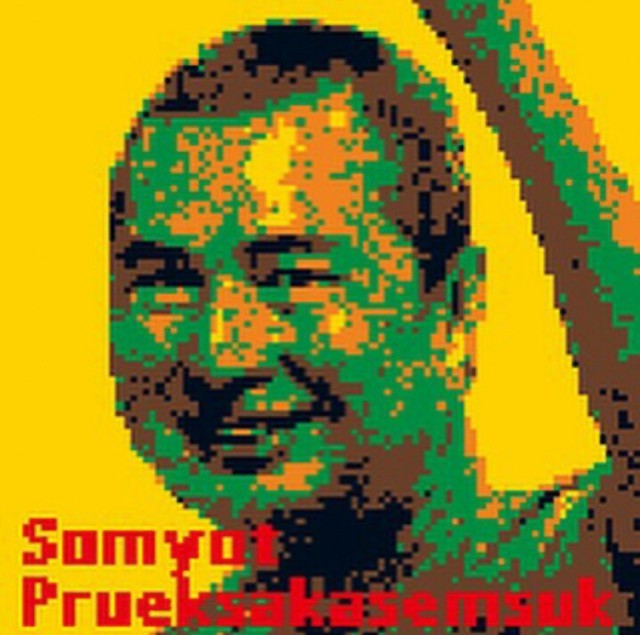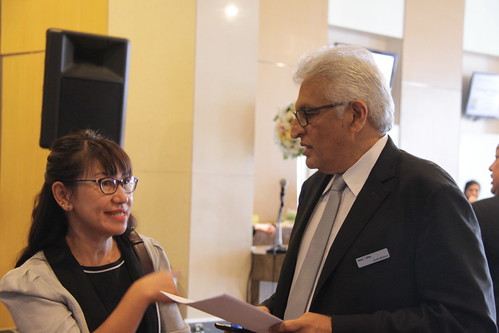On 23 February 2017, the Supreme Court sentenced Somyot Prueksakasemsuk, a labour and democracy activist turned lèse majesté suspect, to six years in prison, ending his six year struggle against the charge. As a man of principle, Somyot was the first lèse majesté suspect in a decade to choose to fight until the end, rather than pleading guilty for a lighter jail term. Prachatai has gathered 14 facts about the man whose legal battle has sparked debate about Thailand’s controversial lèse majesté law.
Who is Somyot Prueksakasemsuk?
Somyot Prueksakasemsuk is a long-time labour and democracy activist turned lèse majesté suspect. From 1977, Somyot was active in campaigning for the right of association of labour unions and the minimum wage. He was among the key labour and student activists who in 1980s played a role in demanding a social security system.
In November 2016, the Korean Confederation of Trade Unions awarded Somyot the Jeon Tae-il Labour Prize to recognise his dedication to labour rights.
Somyot’s political stand
After the 2006 coup d’état, Somyot’s political stand and activism became more intense. He began to take part in anti-coup activities for democracy and in late 2009 became a key member of the United Front for Democracy Against Dictatorship (UDD), the main faction of the anti-establishment red shirt movement. Shortly afterwards, he founded the 24 June Democracy group to organise activities for the promotion of democracy.
Note: 24 June 1932 was the day when the Khana Ratsadon (Peoples' Party) staged a coup d’état against King Prajadhipok, ending 150 years of absolutism under the Chakri Dynasty.

Somyot Prueksakasemsuk (file photo)
Campaign against the lèse majesté law
After the violent crackdown on the red shirt demonstration in April-May 2010 which killed nearly 100 people, Somyot and his political group kick-started a campaign in 2011 to collect 10,000 names for the abolition of Article 112 of the Criminal Code, the lèse majesté law. He reasoned that the law was being used as political tool.
On 30 April 2011, five days after the group started the campaign, Somyot was arrested for lèse majesté.
Arrest and military detention
During the crackdown on the red shirt demonstrations in 2010, Somyot and Surachai Yimprasert, a history lecturer at Chulalongkorn University, were arrested and detained incommunicado at Adisorn Military Base in Saraburi Province, under the Emergency Decree declared by the then Prime Minister, Abhisit Vejjajiva. He was released on 23 June 2010 while Surachai was set free earlier in May.
Accusations and legal battle
Somyot was accused of lèse majesté for publishing in the now-defunct Voice of Taksin magazine two articles written by a contributor with the penname ‘Jitr Pollachan’ in the February and March 2010 issues of the magazine.
Somyot, however, has always maintained that he is innocent on four grounds:
- He did not write the articles. Jitr Pollachan is the pen name of Jakrapob Penkair, former Minister to the Prime Minister’s Office under the premiership of Samak Sundaravej, who was also charged with lèse majesté and is currently living in self-imposed exile.
- He was not the editor of Voice of Taksin magazine. He was merely an employee of the magazine and his job description with the magazine did not match his actual work. Even under the 2007 Printing and Publishing Act, the law does not state that he should be held responsible for the publication of the articles.
- He did not intend to defame the Thai monarchy, but published the articles merely because it was his job.
- The articles do not really constitute royal insults. Individual interpretations of the content of the two articles vary greatly.
Testimonies for and against Somyot
During plaintiff witness hearings, Internal Security Operations Command (ISOC) officers testified that the ‘anti-monarchy plot of then Col Sansern Kaewkamnerd played a part in finalising the decision to file the complaint against Somyot. Sansern himself later admitted that the plot lacks concrete evidence. A Thammasat University student interning at the Department of Special Investigation (DSI) who was given copies of the alleged lèse majesté articles also testified against Somyot.
Tongthong Chandransu, former Permanent Secretary of Prime Minister's Office under Yingluck administration, testified that parts of one of the two articles relating to the transition from the Thonburi to the Rattanakosin periods was defamatory to the monarchy. He, however, said that the penalty of 3-15 years imprisonment for Article 112 is too harsh and should be similar to normal defamation. The law also does not allow defendants to prove their innocence if criticism of the monarchy is expressed in good faith.
Piyabutr Saengkanokkul, a member of the Nitirat group, an association of progressive law academics, testified that the content of the two articles does not constitute a violation of Article 112. He also suggested that the penalty of the lèse majesté should be made similar to normal defamation, which is up to one year in prison or a fine of up to 20,000 baht or both. Niran Pitakwatchara, former National Human Rights Commissioner (NHRC), and Surachai Yimprasert testified that the two articles do not contain references to the monarchy.

Somyot as a young man (photograph provided by Sukanya Prueksakasemsuk)
Tiresome trial in four provinces
Many witness hearings on Somyot case were held in provinces in four different regions across the nation in line with the registered places of residence of witnesses. He was taken from Bangkok Remand Prison to prisons in Sa Kaeo, Songkhla, Phetchabun, and Nakhon Sawan during the trials. He told Prachatai that when he was taken to a prison in Sa Kaeo the food and overall conditions were better than Bangkok Remand Prison. However, it was overcrowded. They prison capacity was 800 inmates, but 2,000 were detained at the facility, so it was very uncomfortable. He said that because there were so many people in a truck transferring inmates from Bangkok to Sa Kaeo, he had to stand all the way.
Consistently denied bail
Somyot’s family and defence lawyer submitted 15 bail requests with surety ranging from 400,000 to two million baht. However, the court consistently denied him bail, citing flight risk and the severity of the charge.
The stronger the principle, the longer the jail term
Unlike many other lèse majesté suspects who have chosen to plead guilty in exchange for a reduced sentence, after which they can begin the process of requesting a royal pardon, Somyot has always stood firm and maintained his innocence.
If he had chosen to plead guilty, his sentence for the lèse majesté charge by the Court of First Instance and the Appeal Court could have been halved and he could have requested a royal pardon or suspension of sentence to further reduce the time spent in prison. For instance, Surachai Danwattananusorn (aka Surachai Sae Dan), a former member of the Communist Party of Thailand turned red shirt member, who was sentenced to 12 years imprisonment on five counts of lèse majesté, only served two years and seven months after he pleaded guilty and was granted a royal pardon.
Court rulings
In 2013, the Court of First Instance sentenced Somyot to 10 years imprisonment for lèse majesté and one additional year of an earlier suspended sentence for defaming General Saprang Kalayanamitr. In 2014, the Appeal Court upheld the sentence. On 23 February 2017, the Supreme Court reduced the jail term on the lèse majesté case to six years.
The first lèse majesté case to reach the Supreme Court in a decade
Somyot’s lèse majesté case of is the first to get to the Supreme Court. Daranee Charncherngsilpakul, aka 'Da Torpedo’, a former lèse majesté convict, vowed to fight her case up to the Supreme Court, but gave up halfway due health problems. Prior to Somyot, Bandid Aneeya, a 71-year-old writer, was sentenced to four years in jail. However, given that Bandid has suffered from mental illness since he was a young adult and is now very old and suffering from other physical illnesses, the court decided to suspend the jail term.
Petition to the Constitutional Court about the lèse majesté law
In 2012, Somyot and Ekachai Hongkangwan, a man convicted of lèse majesté for selling copies of Wikileaks cables and an ABC news documentary on Thailand’s monarchy, submitted a petition to the Constitutional Court to interpret whether Article 112 of the Criminal Code is unconstitutional.
The court ruled “the principles of Article 112 of the Criminal Code are coherent with the protection of the institution of the monarchy and the King who is the head of state. The penalty for offenders is to maintain peace and order and public morals in accordance to the principle of the rule of law and the morality of the law. Therefore, it does not contradict the principle of the rule of law under the second clause of Article 3 of the [2007] constitution ”

A picture of Somyot by Ai Wei Wei
Many organisations issued statements for Somyot
His prominence in the struggle against the lèse majesté law has led many people to organise campaigns to call for justice for Somyot and for the amendment of the lèse majesté law. International organisations, such as Human Rights Watch (HRW), Amnesty International (AI), the European Union (EU) and the United Nations (UN) have issued statements or expressed concerns over his case.
Behind every great man, there is a great woman
Throughout his legal battle, Sukanya Prueksakasemsuk has stood by his side. From the struggle to demand her husband’s release, she has become one of the most prominent activists campaigning against the lese majesté law in her own right and a key member of the 112 Family Network, an organization founded to provide assistance to lese majesté detainees and their families.
As the breadwinner of the family even before Somyot’s imprisonment, she also respects her husband’s decision to fight his case all the way rather than ending it by confession so that he could ask for a royal pardon. Somyot’s wife and children respect his decision and give him support and encouragement.

Sukanya Prueksakasemsuk submits an open letter from her husband to Jacob Mathew, President of the World Association of Newspaper and News Publishers (WAN-IFRA) during the 65th World Newspaper Congress on 6 June 2013 in Bangkok (file photo).

Since 2007, Prachatai English has been covering underreported issues in Thailand, especially about democratization and human rights, despite the risk and pressure from the law and the authorities. However, with only 2 full-time reporters and increasing annual operating costs, keeping our work going is a challenge. Your support will ensure we stay a professional media source and be able to expand our team to meet the challenges and deliver timely and in-depth reporting.
• Simple steps to support Prachatai English
1. Bank transfer to account “โครงการหนังสือพิมพ์อินเทอร์เน็ต ประชาไท” or “Prachatai Online Newspaper” 091-0-21689-4, Krungthai Bank
2. Or, Transfer money via Paypal, to e-mail address: [email protected], please leave a comment on the transaction as “For Prachatai English”
